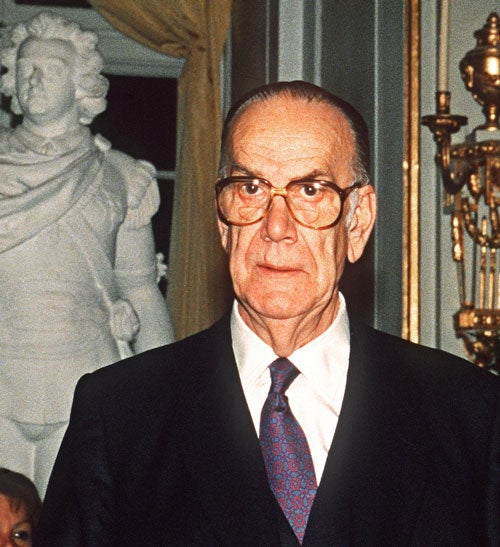Spain's Nobel-winning novelist Cela 'stole passages for his book'

The Spanish Nobel prize-winning writer Camilo José Cela has been accused of plagiarising the work of a lesser known author for one of his best-selling books.
Cela, who died in 2002, was said to have stolen passages for his book La Cruz de San Andrés (The Cross of St Andrew) from a work by Carmen Formoso called Carmen, Carmela, Carmiña.
Now a judge in Barcelona's Constitutional Court has ordered the case, which tarnished the reputation of Cela during his final years, to be reopened. A literary expert has been asked to supply an exhaustive report as to whether Cela was one of Spain's best writers or simply a literary thief.
Cela was a controversial figure whose best-known works are The Hive and The Family of Pasqual Duarte. The latter won him the Nobel Prize in 1989. The Nobel jury described it as the most popular work of Spanish fiction since Miguel Cervantes' 400-year-old Don Quixote. La Cruz de San Andrés won Cela the Planeta prize, one of Spain's top literary awards and made the writer 50m pesetas (then £225,000).
But Ms Formoso, herself an award-winning writer, claimed large parts were lifted from her novel and took the ageing literary legend to court. The case started in 2001 but was never resolved before Cela's death.
Now a judge has ordered Luis Izquierdo, a retired professor of literature at Barcelona University, to respond in detail to 65 points brought when the case last came to court. The first time it was in court, a judge said Cela was not guilty of stealing scenes, characters, works and even words from Ms Formoso's work.
But then the expert told the court there were "echoes and coincidences" between both works. These included the fact that in both novels the story is set in A Coruña in Galicia; they both make reference to the start of the Second Spanish Republic in 1931; both have a character called Jacob and a female character who is expert at cards. Both have a narrator and two other female characters.
Jesús Díaz Formoso, Ms Formoso's son and her lawyer, told a court the expert did not go into enough detail to be able to give a proper opinion and should reread the texts. Mr Díaz Formoso also claims the publisher of Cela's work, Planeta, is guilty of "unauthorised appropriation" of his mother's work. Cela denied the accusations at the original trial.
After Mr Izquierdo has resubmitted his report, a judge will decide if it is worth taking the case to trial or if there is a case to answer. Mostly likely, with Cela no longer able to defend his side, the accusations will go no further. But since his death in 2002, the reputation of one of Spain's most illustrious novelists has taken a series of knocks. In 2004, he was accusedby historian Pere Ysàs of spying for the late dictator, General Francisco Franco, by suggesting "dissident" writers could be "reconverted" to El Caudillo's regime.
Camilo José Cela was born in 1915 in Galicia, to an upper middle-class Spaniard and a British mother. His private life was intriguing. His second marriage to a much younger woman shocked Spain. Famously outspoken, he once boasted on television that he could pump a litre of water through his bottom.
Join our commenting forum
Join thought-provoking conversations, follow other Independent readers and see their replies
Comments
Bookmark popover
Removed from bookmarks